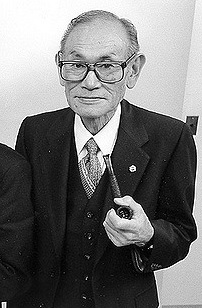
Back فريد كوريماتسو Arabic ফ্রেড কোরমাতসু Bengali/Bangla Fred Korematsu German فرد کورماتسو Persian Fred Korematsu French Fred Korematsu ID Fred Korematsu Italian フレッド・コレマツ Japanese பிரெட் கோரெமாட்சு Tamil 是松豐三郎 Chinese
Fred
Korematsu 是松豊三郎 | |
|---|---|
 | |
| Born | Fred Toyosaburo Korematsu January 30, 1919 Oakland, California, U.S. |
| Died | March 30, 2005 (aged 86) Marin County, California, U.S. |
| Resting place | Mountain View Cemetery 37°50′06″N 122°14′12″W / 37.83500°N 122.23667°W |
| Monuments |
|
| Alma mater | Castlemont High School |
| Known for | Korematsu v. United States |
| Spouse |
Kathryn Pearson (m. 1946) |
| Children | 2 |
| Awards | Presidential Medal of Freedom (1998) |
| Website | korematsuinstitute |
Fred Toyosaburo Korematsu (是松豊三郎, Korematsu Toyosaburo, January 30, 1919 – March 30, 2005) was an American civil rights activist who resisted the internment of Japanese Americans during World War II. Shortly after the Imperial Japanese Navy launched its attack on Pearl Harbor, President Franklin D. Roosevelt issued Executive Order 9066, which authorized the removal of individuals of Japanese ancestry living on the West Coast from their homes and their mandatory imprisonment in incarceration camps, but Korematsu instead challenged the orders and became a fugitive.
The legality of Roosevelt's order was upheld by the Supreme Court of the United States in Korematsu v. United States (1944).[1] However, Korematsu's conviction for evading internment was overturned four decades later in US District Court, after the disclosure of new evidence challenging its necessity, which had been withheld from the courts by the U.S. government during the war.[2] Eventually, the Korematsu ruling itself was overturned about seventy-four years later in Trump v. Hawaii, 585 U.S. ___ (2018).[3]
To commemorate his journey as a civil rights activist posthumously, "Fred Korematsu Day of Civil Liberties and the Constitution" was observed for the first time on his 92nd birthday, January 30, 2011, by the state of California, the first such commemoration for an Asian American in the United States. In 2015, Virginia passed legislation to make it the second state to permanently recognize each January 30 as Fred Korematsu Day.[4][5][6]
The Fred T. Korematsu Institute was founded in 2009 to carry on Korematsu's legacy as a civil rights advocate by educating and advocating for civil liberties for all communities.
- ^ Ford, Matt (November 19, 2015). "The Return of Korematsu". The Atlantic. Retrieved January 30, 2017.
- ^ Savage, David G. (May 24, 2011). "U.S. official cites misconduct in Japanese American internment cases". Los Angeles Times. Archived from the original on June 9, 2011. Retrieved August 10, 2019.
- ^ "Trump v. Hawaii" (June 26, 2018) (PDF) p. 38
- ^ "Welcome". Fred T. Korematsu Institute. Retrieved June 15, 2016.
- ^ "California Marks the First Fred Korematsu Day". Time. January 29, 2011. Archived from the original on February 2, 2011.
- ^ "Fred Korematsu Day a first for an Asian American". San Francisco Chronicle. January 29, 2011.
© MMXXIII Rich X Search. We shall prevail. All rights reserved. Rich X Search